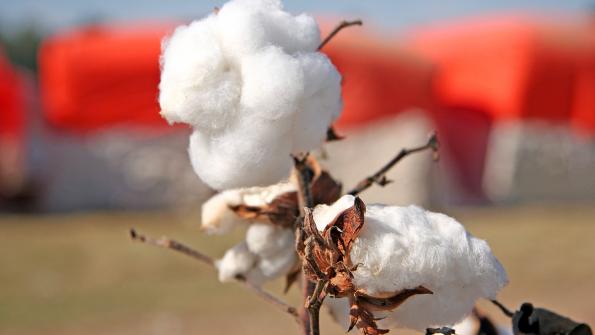
Mid-South cotton looked better in field than basket
Arkansas cotton producers were hoping yields would be better than they were "but there just wasn't much meat in the crop," said the state's Extension cotton specialist Tom Barber.Missouri and west Tennessee cotton crops also looked better from the road than the picker basket, according to specialists.Many Mississippi cotton producers, however, picked a cotton crop that was pleasantly surprising.

It might have been the many stresses of the season, or the heat, but for many Mid-South cotton producers, this fall’s crop looked better in the field than it did in the picker basket. Here’s more on the crop from area specialists:
Arkansas
Extension specialist Tom Barber says the state’s cotton crop is almost complete. Yield and quality “is all over the board, but we’re off 100 pounds to 200 pounds everywhere. Not many growers are picking 1,200-pound cotton or more. Producers across the river caught a few more rains than we did, and the heat probably played a role in our lower yields. Overall, we got a really late start. September fell off on us, and it didn’t mature the top crop out.”
Barber said the crop looked better than it picked. “I think that’s why there is disappointment. Growers were thinking yields would be good. But there just wasn’t much meat in the crop. We didn’t have a lot of low position fruit. But after this year, if they got out with a 2-bale crop, they should be happy, as much as we’ve been through.”
Barber sees cotton acres for 2012 unchanged to declining. “If cotton can’t hold the dollar a pound mark, we’ll lose some acres.”
Bootheel
Mike Milam, cotton agronomy specialist for Pemiscot and Dunklin counties, says harvest is quickly winding down “and everybody I talked to say yields are going to be short of what USDA is projecting.”
Milam said cotton “looked better in the field than when it was harvested. The non-irrigated crop has been a big drag on our average yields, and the late cotton, planted in early June, is obviously not going to have that good a yield. I know there is a lot of disappointment out there, but there is still some good cotton. We won’t have as good a year as last year.”
Tennessee
Yields have been disappointing in west Tennessee, but there have been surprises, too, says Chris Main, Extension cotton specialist for the state. The region was about 80 percent harvested in early November. “Producers are reporting yields from 600 pounds to 1,500 pounds per acre.”
Main said rainfall and planting date played a large role in the yield disparity.
Quality has been all over the board as well, according to Main. “I’ve seen everything on a loan sheet from 48.5 cents up to 55 cents. It’s as good as it is bad. We’ve had micronaire running as high as 5.2.”
Main said cotton “looked a lot better from the road than once we got the picker in it. We also had quite a bit of money in the crop, from plantings and replanting, keeping the thrips off and the plant bugs out. Farmers with irrigation had quite a bit of cost. So it’s been a fairly expensive crop. Everybody is going to make some money because of the high prices. But if it wasn’t for that, we wouldn’t be making any money.”
Based on conversations he’s had with growers, Main anticipates a 20 percent decline in cotton acres in 2012, “which is about what we picked up this year. That’s about 80,000 acres.”
Louisiana
According to Louisiana Extension cotton specialist John Kruse, Louisiana cotton is wrapped up for the year, and yields have been variable.
Kruse said dryland and irrigated producers in northeast Louisiana were pretty pleased. “We have more than a few reports up there of 1,100 pound to 1,200 pound cotton. There were areas along the Delta that did well, but when you get into the southern half of Tensas Parish, there were a lot of fields that didn’t get any rain and really struggled. There is a lot of 1-bale cotton in that area.”
In Concordia and Catahoula parishes “it really got dicey, depending on whether or not they had a rain shower. There were fields that did get close to 2 bales and fields not far away that did around 1 bale. In the Red River and northwest part of the state, we averaged about 1.5 bales.”
Kruse thinks overall cotton yields “will probably be similar to where we were last year. Producers have been most happy about the consistency of the cotton price. It’s held at a dollar or better for the most of the year, and they were able to get a price close to a dollar. That helped make the difference for a lot of folks.”
Kruse pegs cotton acreage for 2012 at unchanged to slightly higher. “I don’t think we’ll have another 10 percent increase like we’ve had the past couple of years. We could see a 5 percent increase unless we see commodity prices shift on us.”
Mississippi
Harvest is winding down in the state, “although this harvest season seems like it crept along,” said Mississippi Extension cotton specialist Darrin Dodds. “But it hasn’t been a bad harvest season, and we really aren’t off the 5-year average (for harvest progress) for the most part.”
Dodds says producers are picking cotton “that is as good or better than they thought. We’ll probably come in with an above average crop. Most producers are fairly happy.”
Dodds says Mississippi producers should wrap up harvest in the next 10 days.
About the Author(s)
You May Also Like





